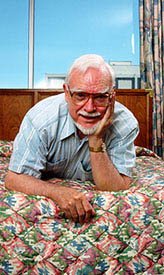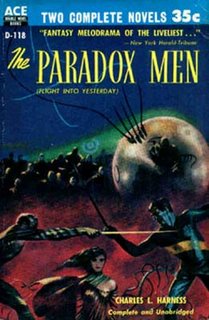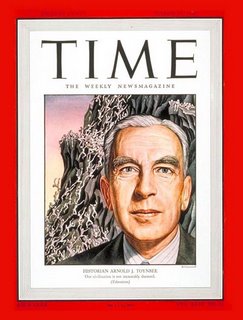#10: The Paradox Men (1953) by Charles L. Harness
“He had not the faintest idea who he was.”
“If the man with the spear could have reasoned first and hurled second, his descendants might have reached the stars within a very few millennia.”
Charles Leonard Harness (1915-2005) was closer to being a true pulp writer than most of the folks on Pringle’s list, but he was also a major influence on many sf writers (particularly Michael Moorcock and Brian Aldiss), even if most fans have never heard of him or read his work. Writing was always a secondary pursuit in his life, regardless of whether that’s the way he wanted it to be or not. A native of Texas, he spent most of his adult life as a patent lawyer out East. He also, like a many sf writers from his generation, had a strong background in science, particularly chemistry, and one passion from his childhood was building his own radio from scrap parts. His writing style was schlock-y, but his science background came through in the end, as it does in The Paradox Men.

Harness always had more of a following in the UK than he did in the States, which has led to a sparse and uneven printing history for TPM. Its first form was a novella, and when it was expanded to book-length form, the title was Flight Into Yesterday. It wasn’t until a later revision and expansion that the book gained the title it is generally referred to by today.

The story itself is a bit of a mess: part swashbuckling adventure, part space opera, and part meditation on the paradoxes of Einsteinian physics and Toynbeean history. The main character is a forgetful fellow known as Alar who has taken up with a society of thieves rebelling against the repressive, slave-sanctioning imperial government of America in the 22nd Century. Alar, like all thieves, wears a protective shield that stops projectiles but not hand-held weapons. Thus, swordplay is in vogue and the best of the best have unusual weight in an otherwise gadget-filled society. An East-West war is on the verge, and a group of Toynbeean historians has built a spaceship they hope will help usher in the next Toynbee civilization, T-22 (also the original working title for Harness’ novella). A fascinating idea really considering Arnold Toynbee has next to no presence in history departments these days. But I digress.

At the heart of the narrative is a time paradox. This spaceship or one just like it crashes on Earth five years before it has been built. One of the passengers is Alar, who has no idea who he is and who exhibits superhuman powers. Gone missing during this same time period is Kennicot Muir, the founder of the thieves’ group. His wife, Keiris, is now a slave wife of mover-and-shaker Haze-Gaunt, who happens to keep as a pet a weird tarsier (also a survivor from the crash) that has the ability to speak but only the phrase “Don’t go! Don’t go!” Crazy enough for you? Well, there’s also a former circus freak named Meganet Mind who can answer any question, a major crash into the Sun, and an appearance by a Neanderthal.

Aldiss calls Harness’ work “Widescreen Baroque,” by which he means a story that transcends space opera and allows its characters to act in an unfettered manner. And while I won’t lie and say that The Paradox Men is my favorite novel of the first ten on David Pringle’s list, Aldiss’ description is true. You never know what’s going to happen on the next page.



0 Comments:
Post a Comment
<< Home